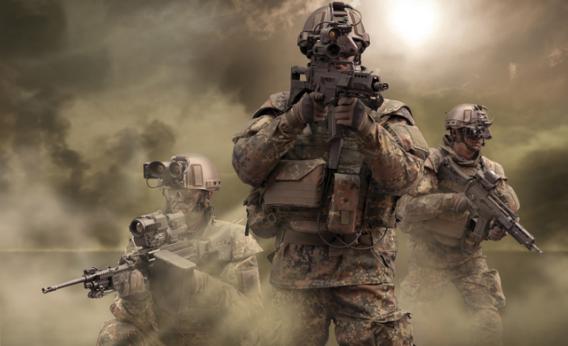The Army is researching physiological sensors that may help Soldiers achieve superior performance on battlefields of the future, said the commanding general of Fort Detrick, Maryland.
Lt. Gen. Joseph Caravalho Jr., commander of the U.S. Army Medical Research and Materiel Command and Fort Detrick, led a panel discussion at the Association of the United States Army’s Medical Hot Topics Forum, Sept. 10. The panel was titled “The Future of Human Performance.”
The Soldiers of 2025 might have sensors that help them detect and prevent threats such as dehydration, elevated blood pressure and cognitive delays from lack of sleep, he said. Sensors might also detect external threats such as chemical exposure or extreme environment.
The Army is currently working on a number of technologies aimed at optimizing human performance, Caravalho said, with an eye toward providing both physical and cognitive overmatch of any potential enemy.
Soldiers of the future need to perform like elite athletes, Caravalho said.
Physical and cognitive overmatch become more important as the Army focuses on the squad as a decisive force, said Col. Deydre S. Teyhen, director of the System for Health and Performance Triad. She served as the panel moderator and said the members would discuss how Soldiers might achieve unprecedented levels of psycho-physical overmatch.
Panel member Dr. Elizabeth Stanley, founder and president of the Mind Fitness Training Institute and an associate professor at Georgetown University, has taught thousands of Soldiers in high-stress environments to build resilience and optimize performance, Teyhen said.
In 2010, Stanley’s research project with Soldiers of the 25th Infantry Division explored which components of Mindfulness-based Mind Fitness Training, or MMFT, were most effective in building resilience. The study included 240 Soldiers deploying to Afghanistan. Five different groups received variations of resilience training and the sixth control group received no training. The study analyzed the effects of resilience training on cognitive tasks before and after deployment.
The Soldier’s “mind-body system” is the most important piece of technology on the battlefield, Stanley said. She said in the same way athletes practice to achieve muscle memory, certain practices can help “rewire the brain.”
In today’s uncertain environment, building adaptive capacity in Soldiers is the best investment the Army can make, Stanley said.
Speaking next was Dr. Jefferey S. Palmer, a bio-mechanical engineer with MIT Lincoln Laboratory. He said the human body is the “most complex control system in the world.”
Monitoring biomolecular data and psychological stressors can help optimize performance, Palmer said. Special Forces Soldiers especially find tactical value in this, he said.
Muskuloskeletal injuries have an extraordinary cost, said Dr. Phil Plisky, assistant professor and sports residency program director at the University of Evansville and ProRehab, PC. Despite the “astronomical” costs of injuries, prevention programs are “tremendously under-resourced,” he said.
Some muskuloskeletal injuries can be prevented by monitoring stress and risk factors, Plisky said. Sensors that monitor heart rate, blood pressure and other biophysical functions can help predict when there’s a high likelihood for injury, he said. He has an algorithm that measures risk factors for injuries.
When physical risk factors combine with negative psychological factors, that could be catastrophic, Plisky said, and that’s when injuries are most likely to occur.
The Army is teaming with Baylor University to screen injury-risk factors, Teyhen said. The MP3 study or Military Power, Performance and Prevention trial plans to screen 1,750 Soldiers using new hand-held technology. Once assessed, each Soldier’s data is transmitted to a computer that uses an algorithm to determine their risk factor for musculoskeletal injury.
If a Soldier is found to be at high risk of injury, then corrective steps will be prescribed by an Army physical therapist.
With the Army getting smaller, it’s more critical than ever that Soldiers be injury-free and fit for deployment, Caravalho said.










